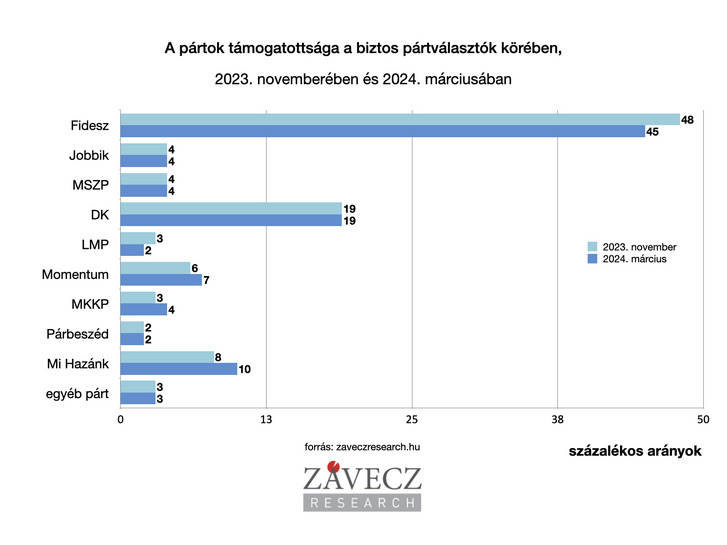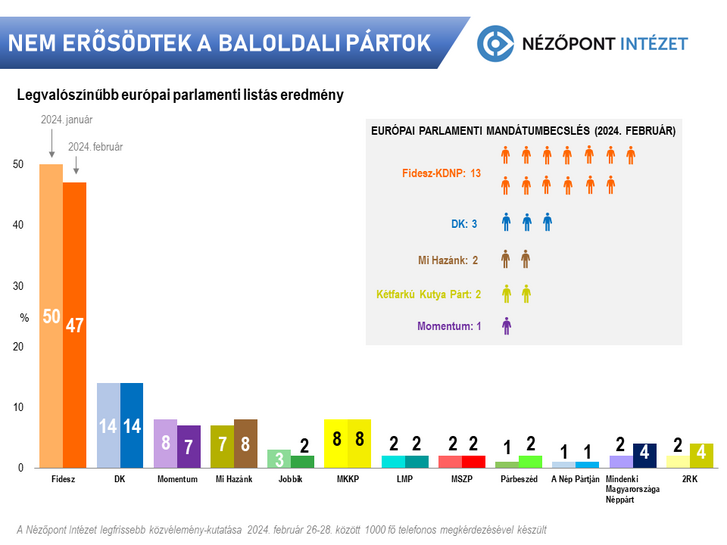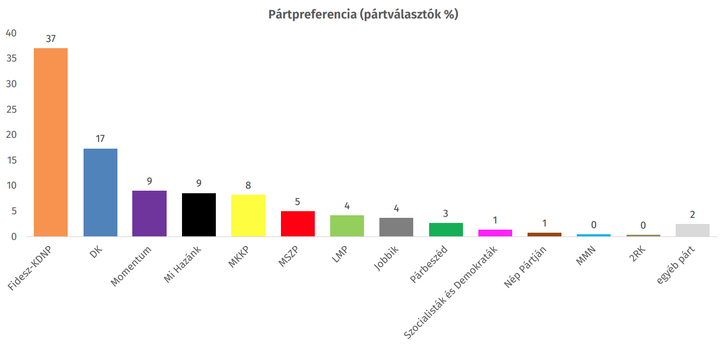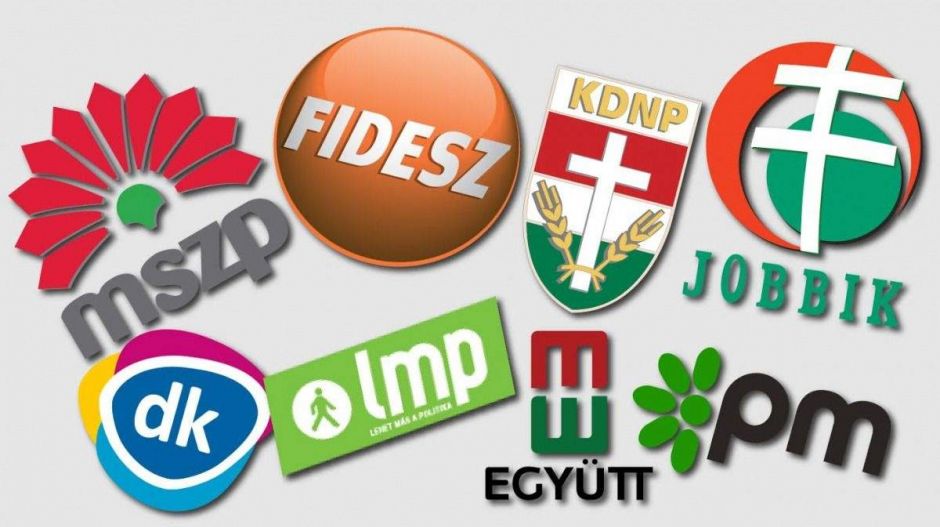The public opinion polls conducted since the pardon case almost unanimously show that although Fidesz-KDNP lost a few percentage points in its support, this did not appear as a surplus among the opposition parties. We show data from three institutes.
"Last November, Fidesz was supported by 32 percent of the voting age population, now 29 percent would vote. The ruling party's current result is the lowest since the 2022 elections, according to opinion poll data. His advantage is still huge, because the opposition parties have not been able to strengthen themselves in recent months," reads the research of Závecz Research, which was prepared between February 29 and March 9, 2024, with a personal survey of a thousand people.
The Democratic Coalition is in second place with 13 percent (after 14 percent last fall), and Mi Hazánk Mozgalom is third, unchanged, with 6 percent. The proportion of Momentum's supporters is also constant in Závecz - 5 percent - while MSZP and Jobbik, measured at 3 percent and 3 percent of the entire voting-age population, were still able to reach 4 percent and 4 percent respectively in November last year.
The Kétfarkú Kutya Párt remained at 3 percent, the LMP dropped from 3 to 2, while Párbeszéd remained at 1 percent. In Závecz, the Socialists and Democrats and the People's Party also reached 1 percent.
The decrease in the support of Fidesz and several opposition parties contributed to the significant increase in the proportion of people without a party: from 25 to 32 percent.
Support for Fidesz also decreased among certain party voters who promised to participate, but the party still stands at 45 percent, after the previous 48. The order of strength in this category:

Photo: Závecz Research
According to Závecz's measurements, the decline of Fidesz can be felt somewhat in all socio-demographic groups, but in two it exceeds the average of 3 percentage points: among those living in county seats and those aged 40-59, the Fidesz camp has become smaller by 9 percentage points each.
"One of the consequences of these changes is that, while in the previous survey the support of the ruling party was divided between Budapest and the countryside (24 in Budapest, 34-34 in the county seats and small and medium-sized towns, and 35 percent in the villages), now it is more between big cities and other settlements. This time, the Fidesz camp is 23 percent in Budapest, 25 percent in the county seats, 32-32 percent in the other cities and villages," reads the analysis, which also revealed that the proportion of non-partisans rose to record heights, since the elections there have not been so many people who distance themselves from politics. brackets. This is called an unusual phenomenon, signs of activation tend to show a few months before the elections.
"It had no effect on Fidesz's leadership position"
"Based on the results of the research, the left-wing parties did not strengthen after the amnesty case, and it did not affect the leadership position of Fidesz either"
– this was already read in the analysis of the Viewpoint Institute. Their public opinion polls will be held on January 2–5 and February 26–28, 2024. between 1000 people by telephone.
Nézőpont's numbers show that the Fidesz-KDNP list would win 47 percent of the votes in a European Parliament election this Sunday, which is within the margin of error compared to the 50 percent in January.

Photo: Viewpoint Institute
The Democratic Coalition is still at 14 percent, Momentum has dropped from 8 percent to 7 percent compared to January, while the Hungarian Two-Tailed Dog Party and Mi Hazánk Mozgalom are also at 8 percent.
Falling Fidesz, non-profitable opposition
The Republikon Institute February 21–28. conducted research by interviewing 1,000 people by telephone, with two main findings:
"The popularity of Fidesz-KDNP fell significantly in February thanks to the pardon scandal. Although the support of the party fell by only 2 percentage points among the entire population, from 28 to 26 percent, at the same time it lost 6 percentage points among party voters, from 43 to 37 percent. This is a negative peak in more than two years. However, the opposition was not able to profit from the decline of Fidesz-KDNP, most of the opposition parties' support did not increase or barely increased. Overall, changes within the margin of error can be measured within the opposition camp."

Photo: Republikon Institute
At Republikon, DK's support among the entire population remained unchanged at 12 percent, and among party voters it fell by two percentage points, from 19 to 17 percent. Momentum, on the other hand, gained slightly, by 1 percentage point among the entire population and 2 percentage points among party voters. Mi Hazánk, also at 9 percent, and MKKP, at 8 percent, cross the five percent threshold. The MSZP balances on the threshold with 5 percent, and the LMP and Jobbik are close at 4 percent each.
Featured Image: Facebook













